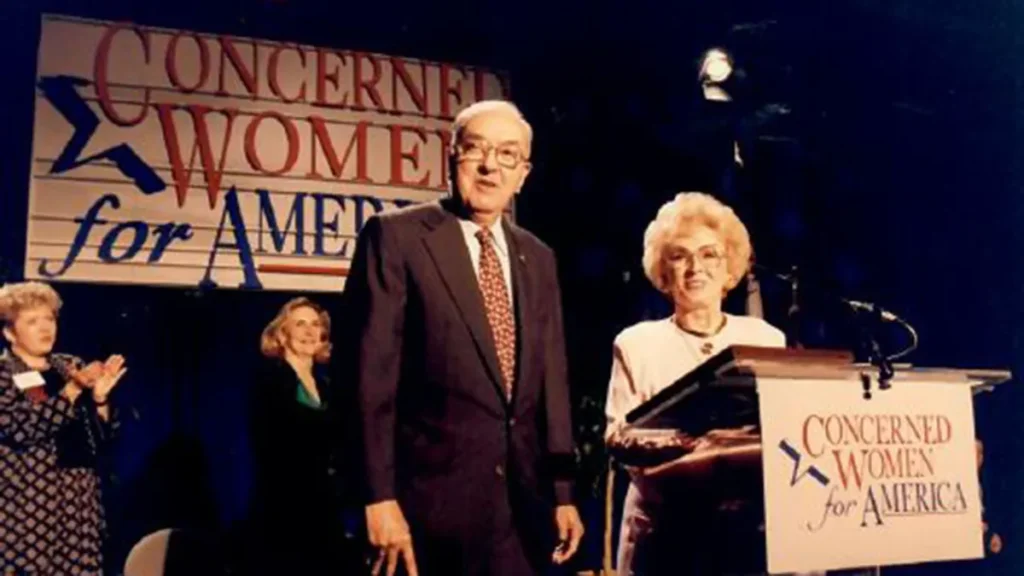“Submission is God’s design for woman”

In the 1980s, Mrs. LaHaye ran an office in Washington of more than 25 employees, including lawyers and lobbyists. She urged Congress to send military aid to the right-wing contras of Nicaragua; rallied her members to barrage the television networks to protest condom commercials; and testified in the Senate for President Ronald Reagan’s Supreme Court nominees Antonin Scalia and Robert Bork.
President Reagan appeared at Concerned Women of America’s 1987 convention, as Judge Bork’s nomination was facing fierce liberal opposition. He was greeted by signs stating, “All Ladies Want Bork.” (The Senate rejected him.)
“In just a few short years,” the president told Mrs. LaHaye’s crowd, “you’ve become the largest politically active women’s group in the nation.” He called Mrs. LaHaye “one of the powerhouses on the political scene today.”
….
In some ways, Mrs. LaHaye’s life was a model of the female empowerment championed by the feminist movement. She was a working woman who got a job in the 1950s to help support her struggling husband; a homemaker who wrote of her “smoldering resentment” of housework; and the author, with her husband, of a popular marriage manual for Christian couples with advice on how to avoid “a lifetime in the sexual wilderness of orgasmic malfunction.”
Married to an evangelical pastor, Tim LaHaye, co-author of the best-selling apocalyptic “Left Behind” novels, Mrs. LaHaye founded her organization to halt the proposed Equal Rights Amendment, which would outlaw discrimination based on sex.
Conservatives argued that the E.R.A. would expose women to a military draft and pressure housewives into the work force. “When the Equal Rights Amendment says no discrimination in sexes, it means no difference in the sexes,” Mrs. LaHaye told The Chicago Tribune in 1980. “Christianity cannot agree with that.”
…
But rather than rebel at the limitations of the role of wife and mother, as many American women were doing in the 1960s and ’70s, Mrs. LaHaye determined that the Bible intended women to submit to their husbands and to embrace domesticity, as a way of serving Jesus.
“This is a truly liberated woman,” she concluded. “Submission is God’s design for woman.”
As Mr. LaHaye’s congregation expanded into a megachurch, Mrs. LaHaye’s confidence grew. By the mid-1970s both husband and wife were published authors; they also collaborated on the multimillion-copy hit “The Act of Marriage,” which included advice for Christian couples on sexual pleasure.
While watching a TV interview in 1978 with Ms. Friedan, the trailblazing feminist who was a founder the National Organization for Women, Mrs. LaHaye was tipped into political activism. NOW, she was quoted as saying by Christianity Today, did not speak for “average, normal and traditional women.”
She gathered a group of church women for coffee. That get-together snowballed into her national organization, which eventually grew to include hundreds of thousands of members.
Opposition to gay rights particularly energized Mrs. LaHaye. She vehemently opposed laws protecting gay men and lesbians from discrimination, and she supported barring gay men from being teachers, deploying the lie that they were more likely to prey on children. “I’m not saying they all are, but the movement itself is aggressively trying to go after boys,” she told The Chicago Tribune in 1992.
The obituary doesn’t even get into her time with the John Birch Society. Wish I had remembered she was still alive, would have written one myself.


